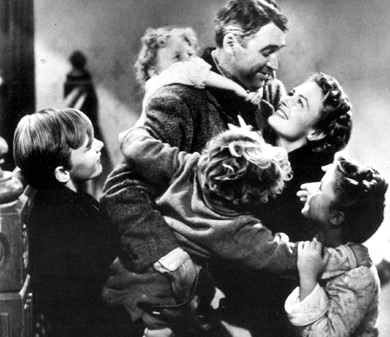Merry Christmas You Wonderful Old FBI!
 Our Sunday School class has been watching Frank Capra’s classic Christmas movie It’s a Wonderful Life recently and discussing it in the context of scriptures such as Philippians 2:3 and Psalm 90:17. Jimmy Stewart’s character George Bailey was indeed a man who “considered others better” than himself and who had the unique opportunity to see what difference the “work of his hands” made in the life and times of the people of the fictional town of Bedford Falls, New York. Like Clarence the Angel, we “like that George Bailey”–how could anyone not, right?
Our Sunday School class has been watching Frank Capra’s classic Christmas movie It’s a Wonderful Life recently and discussing it in the context of scriptures such as Philippians 2:3 and Psalm 90:17. Jimmy Stewart’s character George Bailey was indeed a man who “considered others better” than himself and who had the unique opportunity to see what difference the “work of his hands” made in the life and times of the people of the fictional town of Bedford Falls, New York. Like Clarence the Angel, we “like that George Bailey”–how could anyone not, right?
Well, it may surprise you that in 1946 when the movie was first released, the movie was unmercifully panned by critics as “too corny” and promptly flopped at the box office (it was not until PBS began re-broadcasting the movie in the 1970s that it finally got its second wind and became a Christmas classic). To add insult to injury, the FBI placed It’s a Wonderful Life on a list of “subversive” films with Communist overtones. According to a report in 1997 by Professor John Noakes of Frankin & Marshall College, the FBI took issue both with the negative portrayal of free enterprise and capitalism in Lionel Barrymore’s “Scrooge-like” character of Mr. Potter and the triumph of the “common man” George Bailey. A partial copy of the report is available for viewing here (It’s a Wonderful Life is mentioned on the 2nd page).
Of course, this was at the beginning of the Second Red Scare, a time of grave national angst over Communist infiltration of American institutions which began after World War II and was famously characterized by the intense anti-communist activities of Senator Joseph McCarthy. Now those of you who have ever heard me talk about bringing a heavy dose of humility to the study of history know I’m not going to stand here and wag my finger too hard at my ancestors. Had I lived in the days of “duck and cover” drills, I might have gotten a little jumpy too. Still, years later, it’s difficult to conceive how J. Edgar Hoover could have had a humble and gentle soul like George Bailey in his crosshairs.
The real irony is that George was also a financial guy like Mr. Potter, the difference being George represented small business with a soft heart as opposed to Potter’s mega-corporate coldness and heart of stone. As Noakes points out in his 1997 report, the real conflict which Capra sought to portray in the film was not communism versus capitalism but big capitalism versus the “mom and pop” small town institutions represented by the Bailey Brothers Building and Loan. Echoes of that skirmish continue unabated to this day.
Well, in any case, I’m glad that little bit of “subversive” ugliness is behind us and we can watch and enjoy It’s a Wonderful Life without being branded un-American. The movie is now available in a DVD version which contains some nice extras and NBC is doing a special Christmas Eve broadcast this year which will include a Descriptive TheatreVision presentation for the blind and visually impaired narrated by former President George H. W. Bush.
So get your family together on the night before Christmas and watch this American classic. If you look out the window and see a couple of “men in black” parked in an unmarked sedan with U.S. government plates, just march across the street, tap on the window, and yell, “Merry Christmas you wonderful old FBI!” Then invite the G-men in for a little eggnog and Christmas cheer. If they seem a little hesitant, tell them not to worry–J. Edgar Hoover will never know.
10 Comments
Comments are closed.

Hoots Musings
Mike,
Thank you for the history lesson on the movie, “It’s a Wonderful Life.” I knew it was a flop when it opened in 1946, but I had no idea how it was considered communistic.
I love the movie, and had never sat down and watched it in its entirity (sp) until two years ago.
My sweet husband always cries when he watches it.
Maybe someone needs to slip some rum in the FBI’s eggnog! LOL
Another great post!
Lynda Bee
Well Mikey B! It’s you! It’s you!
Yes – I saw your post on Patrick’s blog. We’re lucky enough to have him and his son-in-law as full-time ministers at our church (I know – you’re jealous!)
I love how your mind works! This is also one of my favorite movies – and my hubby’s too. (I also love “White Christmas” – always a sucker for Irving Berlin!)
I don’t have a blog yet. Too busy with 3 munchkins all 9 and under! (Yes – I started late! Keeps me young!)
So good to hear from you! Write soon! (beemail@quixnet.net)
God Bless!
Bee
mike
Hoots–
Thanks! I have several moments in that movie where my tear film is produced in copius amounts, rises up from the inferior cul-de-sac and pours over the edge of my lid margins.
There are so many positive messages, including a healthy, balanced and robust view of sexuality that doesn’t pull back the curtain all the way and ruin the surprise. More on that in a follow-up post…
mike
Lynda Bee–
Well hush my little ol’ Harding Bison mouth, I thought that was you (it was the Michigan thing that gave you away)!
Uh oh, you sent me your email. That means you’ll be getting one of the infamous and newsy (thunder, evil laughter) “Brown Christmas Letters” to get you updated.
I’ll get it to you soon and get you caught up. Glad I ran into you in the blogosphere!
extremist
Mike,
I think the sources you cite are misleading. I’m not a big defender of the FBI, nor do I want to be a wet-blanket or take a light-hearted post too seriously.
But, honestly, you can’t *really* think that the FBI considered my favorite movie of all-time to be subversive. The document you cited clearly attributes the silly statements about the supposedly anti-capitalist message of “It’s a Wonderful Life” to some source (whose identity is redacted). Documenting and reporting that a source said “x” is not the same as adopting “x” as the FBI’s own view.
Yet, the report you cited from Franklin & Marshall said that “the FBI branded ‘It’s A Wonderful Life’ . . . as subversive.” Unless I’m missing something or there is other evidence of the FBI engaging in some other anti-Bailey activity, then there is a problem here. It looks like either F&M’s summary is intellectually dishonest or it is sloppy.
mike
But Ex, it’s in Wikipedia, it’s in Wikipedia! And we all know that Wikipedia is an unimpeachable source, correct?! 😉
It’s true the source is redacted (dang, I hate when people use big lawyer words that I have to go look up!), but the source’s opinions were apparently considered important enough to be included in a memo to “The Director.” It’s also true that we should probably be careful in labeling this an “official” FBI position, although it would be difficult to believe that the presence of the memo in FBI files didn’t influence the thinking of at least some members of the agency.
Having said all that, I don’t for a moment believe that this movie was as much of a concern to Hoover and crew as were the Ethel and Julius Rosenbergs of the world. I simply think that it’s an interesting historical footnote on a, well, wonderful movie!
I also agree that the alleged mistreatment of capitalism is silly and bogus. One only has to look at the beneficent character of Sam Wainwright to see an example of big capital with a heart.
extremist
Well, this may have to be my first attempt to fix a Wikipedia entry then. Anyone can. 🙂
This passing reference in one memo doesn’t mean much of anything without some other evidence.
“One only has to look at the beneficent character of Sam Wainwright to see an example of big capital with a heart.”
Hee-haw Mike! And don’t forget the virtues of free-market competition between the Bailey Building & Loan and the Potter empire, even in the face of economic panic at the beginning of the depression. Nowhere in the film do the Baileys look to the government to force their views on the community — instead Potter tries to use the government to put his competition out of business by having George arrested.
I do love this film. Its themes are more spiritual than political. I doubt the Godless commies would have considered it effective propaganda, given its narrative is driven by a conversation between angels in heaven and its ultimate moral is that you should count your blessings and be content. Not exactly a call to revolution.
mike
Amen! I’ll be watching with great interest as you attempt to “infiltrate” the walls of Wikipedia to amend the record!
I bet you’re just a little bit jealous that your aren’t in our Sunday school class, eh?
extremist
I signed up for a Wikipedia account and fixed it. It’s not very user friendly. I wish they would improve the interface for discussion about a page. Plus it wouldn’t let me link to the FBI memo b/c the source site is on a spam blacklist. I submitted a request to remove it from the list so the original source can be linked directly from the article.
I am more than a bit jealous. That sounds like a great class.
mike
Hee Haw and Hot Dog! That’s right, that’s right! Atta boy, Ex!